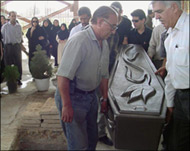Iran ministry denies involvement in death
Iran’s Intelligence Ministry has denied any involvement of its personnel in the death of an Iranian-Canadian photojournalist.

The Tehran prosecutor said late on Monday two of the ministry’s agents had been charged in connection with the “quasi-intentional” murder of Zahra Kazemi, 54, who died of a brain haemorrhage on 10 July following interrogation.
“The Ministry of Intelligence denies the charges brought by the Tehran public and revolutionary prosecution office on its two employees,” a statement was quoted as saying.
A Deputy Minister, identified only by his surname Shafeii, described the charges as “sheer lies” on Monday night, according to an Iranian news agency.
The prosecutors said the two agents had questioned Kazemi between her arrest on 23 June and her hospitalisation four days later.
She was arrested while taking unauthorised photographs of prisoners’ relatives outside Tehran’s Evin prison.
Canada and some supporters of Iranian President Muhammad Khatami say she died as a result of violence by officials.
Closure
 |
|
Kazemi was buried in Shiraz, Iran |
Following announcement of the charges, Canada said it hoped justice would be done.
A Canadian foreign ministry spokeswoman said Ottawa wanted “to see the people responsible face justice”.
Kazemi’s death had sparked a diplomatic row between Iran and Canada.
On 26 July prosecutors announced the arrest of five people, two of them were later released.
The case now has five days to be transferred to the chief criminal prosecutor who will decide if further investigation is warranted or if the case will go to trial immediately.
For a conviction the prosecutor will have to establish when Kazemi was hit on the head. During her detention she was transferred between different security services, but also the prosecutor’s office and police.
The investigation has caused rifts among those various offices, further exacerbating tensions between reformers who back Khatami and the courts, which are controlled by Iran’s conservatives.